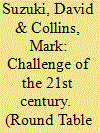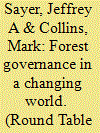|
|
|
Sort Order |
|
|
|
Items / Page
|
|
|
|
|
|
|
| Srl | Item |
| 1 |
ID:
090888


|
|
|
|
|
| Publication |
2009.
|
| Summary/Abstract |
This article outlines the gravity of the environmental crisis-pollution, climate change, overpopulation and the unpredictable environmental impacts from our use of science and technology and exploitation of natural resources. We must put the 'eco' back into economics and realise what the conditions and principles are for truly sustainable living. We have to set a new bottom line, a bottom line dictated by the reality that we are biological creatures, completely dependent for our survival and well-being on clean air, clean water, clean soil, clean energy and biodiversity. We are social animals who need strong families and supportive communities, full employment, justice, equity and security and freedom from racism, terror, war and genocide. And we remain spiritual beings who need sacred places in the natural world that gave us birth.
|
|
|
|
|
|
|
|
|
|
|
|
|
|
|
|
| 2 |
ID:
112474


|
|
|
|
|
| Publication |
2012.
|
| Summary/Abstract |
There has been intense international debate on the governance of forests, in particular tropical forests. This has been driven by contrasting pressures from conservation and human rights groups, respectively calling for global values to prevail so as to protect biodiversity and reduce climate change, or for freedom of choice that empowers local people with the right to manage their own forests. Both sides have condemned irresponsible behaviour by forest officials and political actors, and highlighted the harmful impacts of disregard for the law. However, these normative approaches to forest governance have coincided with a fundamental re-examination of the objectives that societies have for their forest resources. The debate is not only about legality, but also about the legitimacy of forest laws and institutions. This review explores the divergence of views on long-term goals for forests and the implications for their governance. It emphasises that the real challenge is to reconcile the management of forests for values that accrue at different spatial and temporal scales. Forest governance needs to adapt, moving away from a framework based upon the neatly defined boundaries beloved of international organisations and treaties, and submitting to a constant process of adaptation and improvisation at a more local scale. The challenge is to find ways to aggregate such approaches into something that recognisably addresses the global values of forests and forest landscapes. Commonwealth countries have a wide range of forest conditions and are innovating with a range of governance options that provide lessons of potentially wide application.
|
|
|
|
|
|
|
|
|
|
|
|
|
|
|
|
|
|
|
|
|